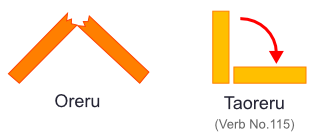| to break, snap, fracture | 折れる |
| to yield to, accept (a demand), compromise |
|
masu Form
|
Plain Form
|
Other Forms
| te form | orete |
| ba form | orereba |
| potential | orerareru |
| imperative | orero |
| volitional | oreyoo |
| passive | orerareru |
| causative | oresaseru |
| caus. passive1 | oresaserareru |
| caus. passive2 | - |
[vt] = Transitive verb / [vi] = Intransitive verb / G1, G2, G3 = Group 1, 2, 3
ba form = conditional form / caus.passsive1 = causative passive long form / caus.passsive2 = causative passive short form
Basic structures
[ subject ] ga oreru

Hone ga oreru
Hone means "bone" and Hone ga oreru is common phrase meaning "have a bone broken", "bone is broken".
This phrase is often used as an idiomatic expression meaning "have difficulty (to do)" or "be a hard job".
See example No. 5
This verb is an intransitive verb.
There is a transitive verb Orimasu / Oru.
Example sentences
 |
1. | Ki no eda ga oreta. |
ki tree, eda branch
 |
2. | Kaze ga tsuyokute, yotto no masuto ga oreta. |
kaze wind, tsuyokute te form of tsuyoi indicating a cause; strong, powerful
yotto yacht, masuto mast
 |
3. | Take wa magaru kara, (Take wa) ore-nikui. |
take bamboo, magaru to bend, curve, -kara because, therefore, so
-nikui (stem +) difficulty to do, not easily do
 |
4. | Ashi no hone ga oreta. Naoru no ni, 1-kagetsu kakaru soo da. |
ashi leg, foot, hone bone
naoru to be cured, recover, be get well, -no ni for doing, to do, in order to do
ikkagetsu one month, kakaru to take time, -soo da reported information; I heard, they said
 |
5. | Kono shigoto wa hone ga oreru. |
shigoto work, job, business
 |
6. | A-sha wa B-sha ni nesage o yookyuu shita. B-sha wa A-sha no yookyuu ni orete, nesage o shita. |
A-sha A company, nesage [sv] price cut, reduction in price, yookyuu [sv] request, demand
orete te form of oreru used as a conjuntion "and"
Functional patterns used in the sentences (Chapter numbers are from Building Up Conversation)
kaze ga tsuyokute / yookyuu ni orete
te form :used as a conjunction "and", also expresses a reason or a cause; "because", "due to"
Level 2 Chapter 6
take wa magaru kara
plain form + kara:expressing a reason or a cause; because, therefore, so
Level 2 Chapter 3
take wa ore-nikui
verb stem + -yasui and -nikui:"easy to do", "comfortable to do" & "difficult to do"
Level 3 Chapter 9
naoru no ni
-no ni:expressing purpose; for doing, to do, in order to do
Level 3 Chapter 10
1-kagetsu kakaru soo da
plain form + soo desu:reported information; I heard, he/they said
Level 2 Chapter 11
| Copyright (C) | CosCom Language Service, Inc. | All Rights Reserved. |